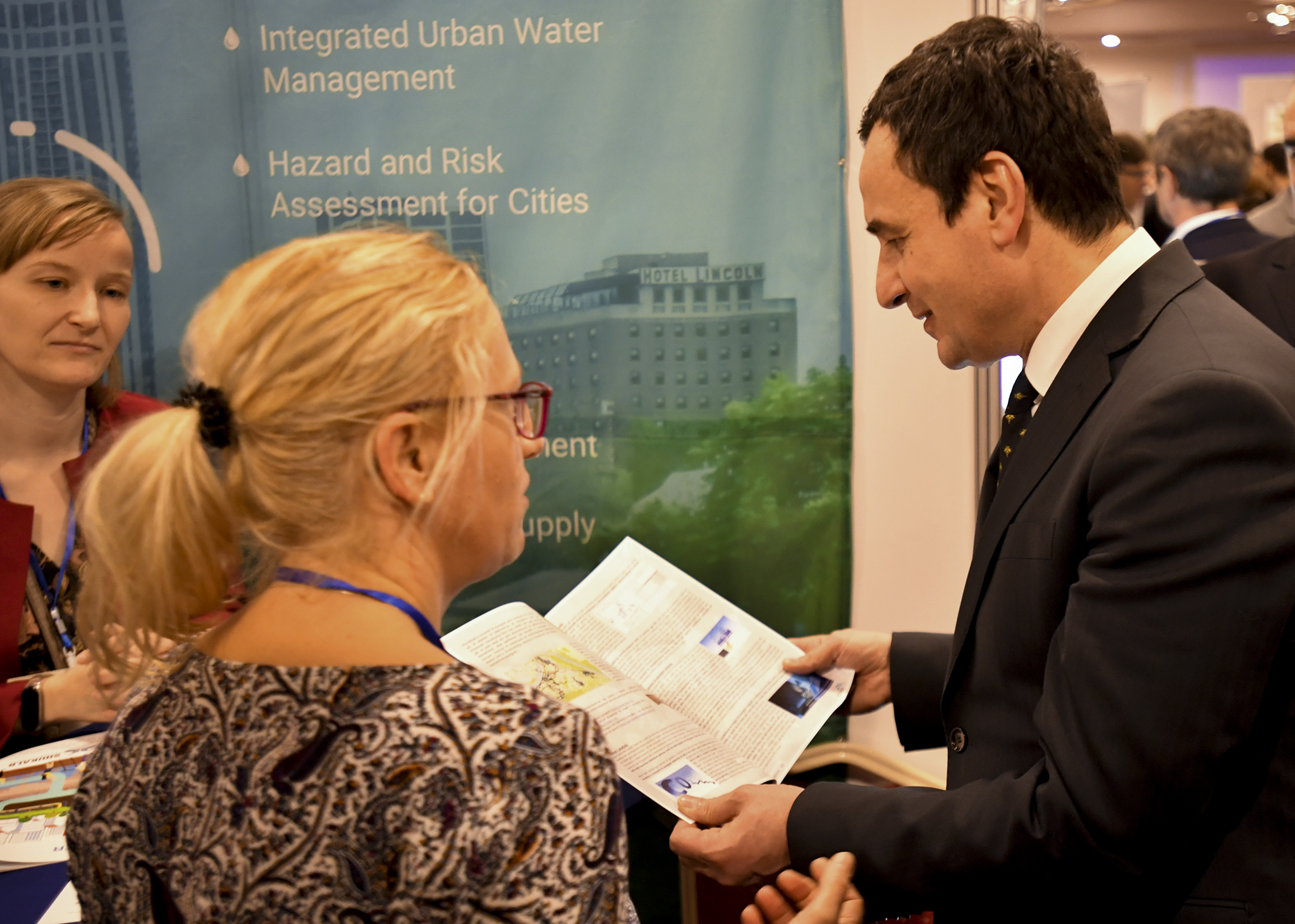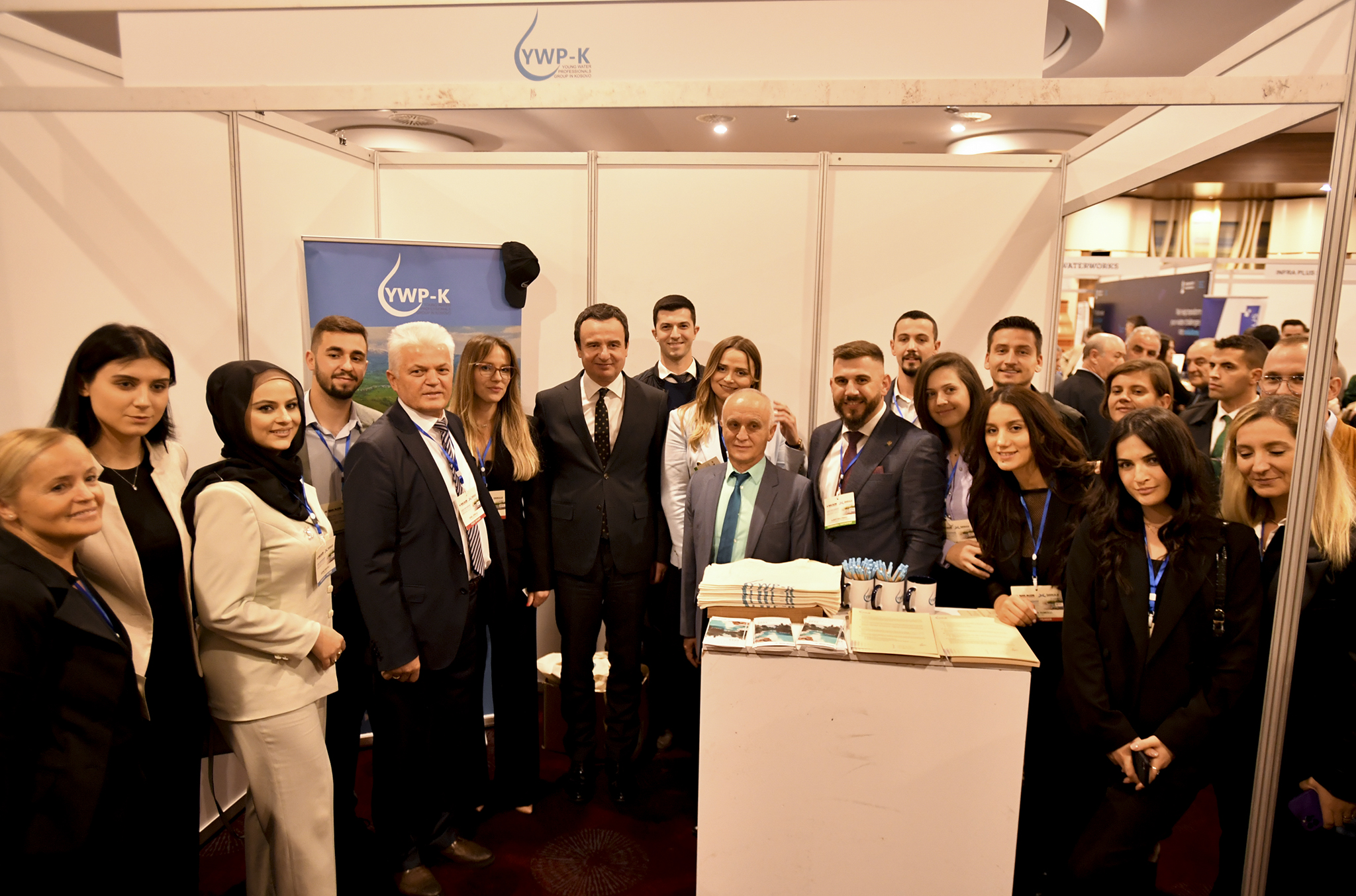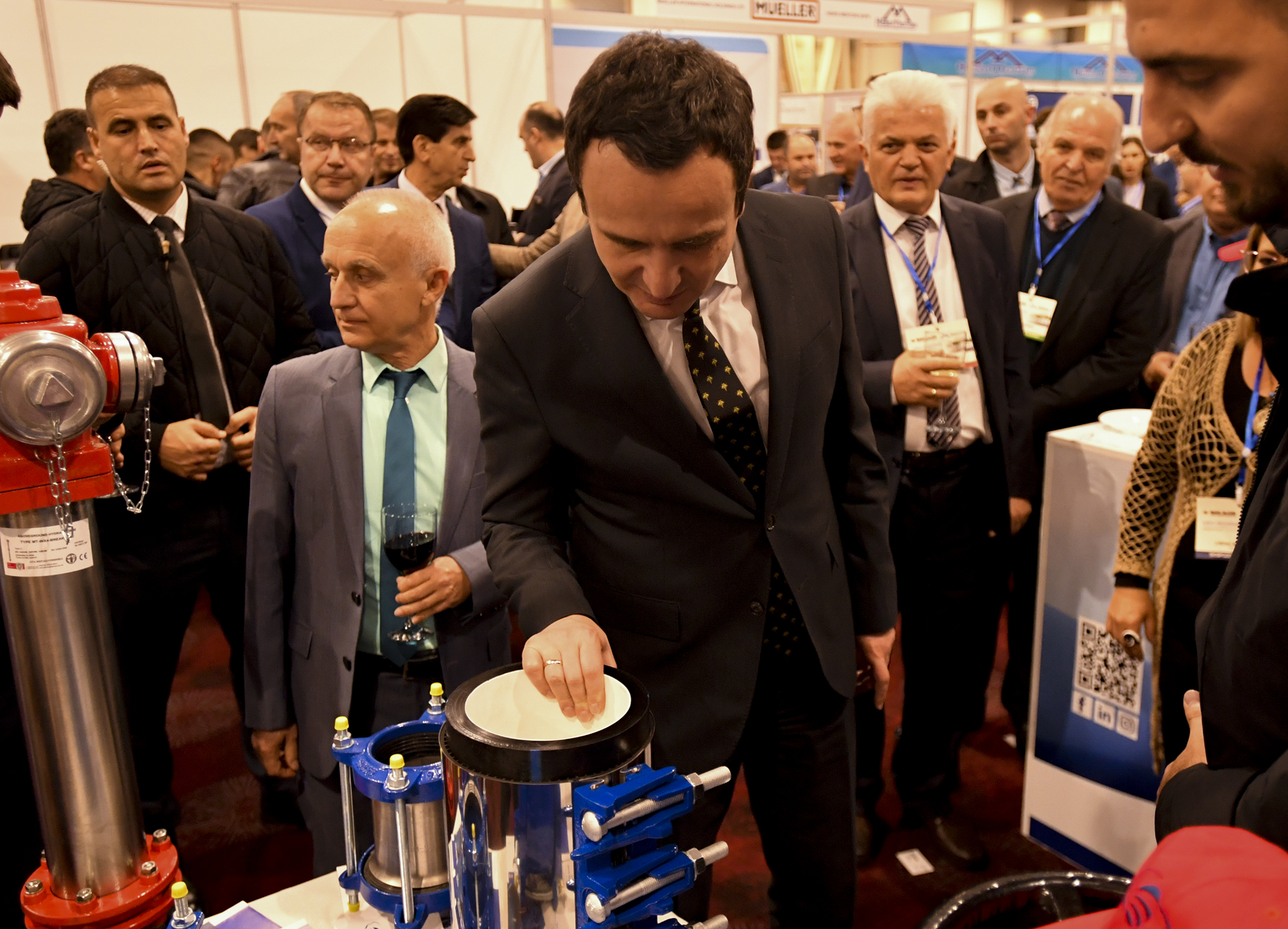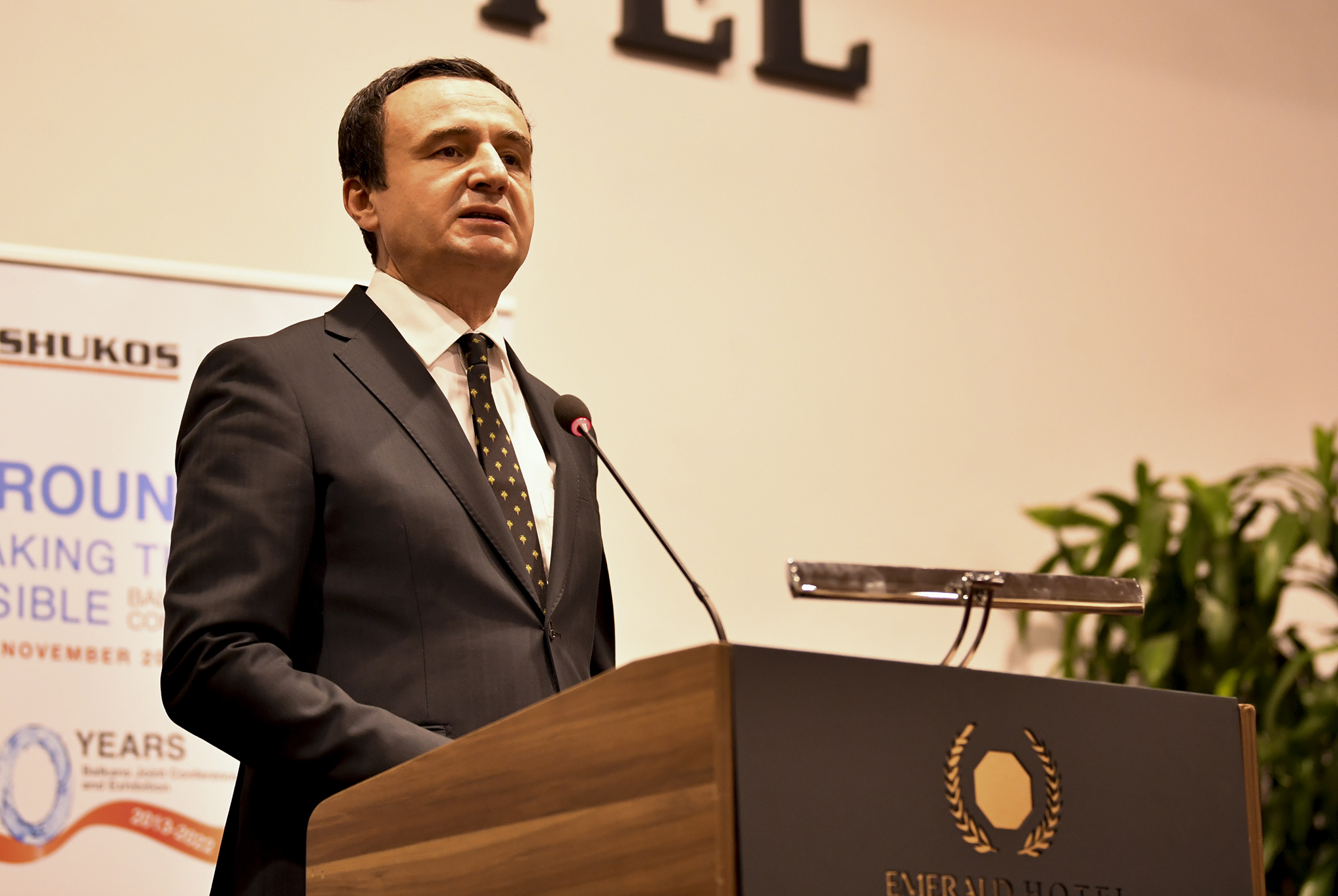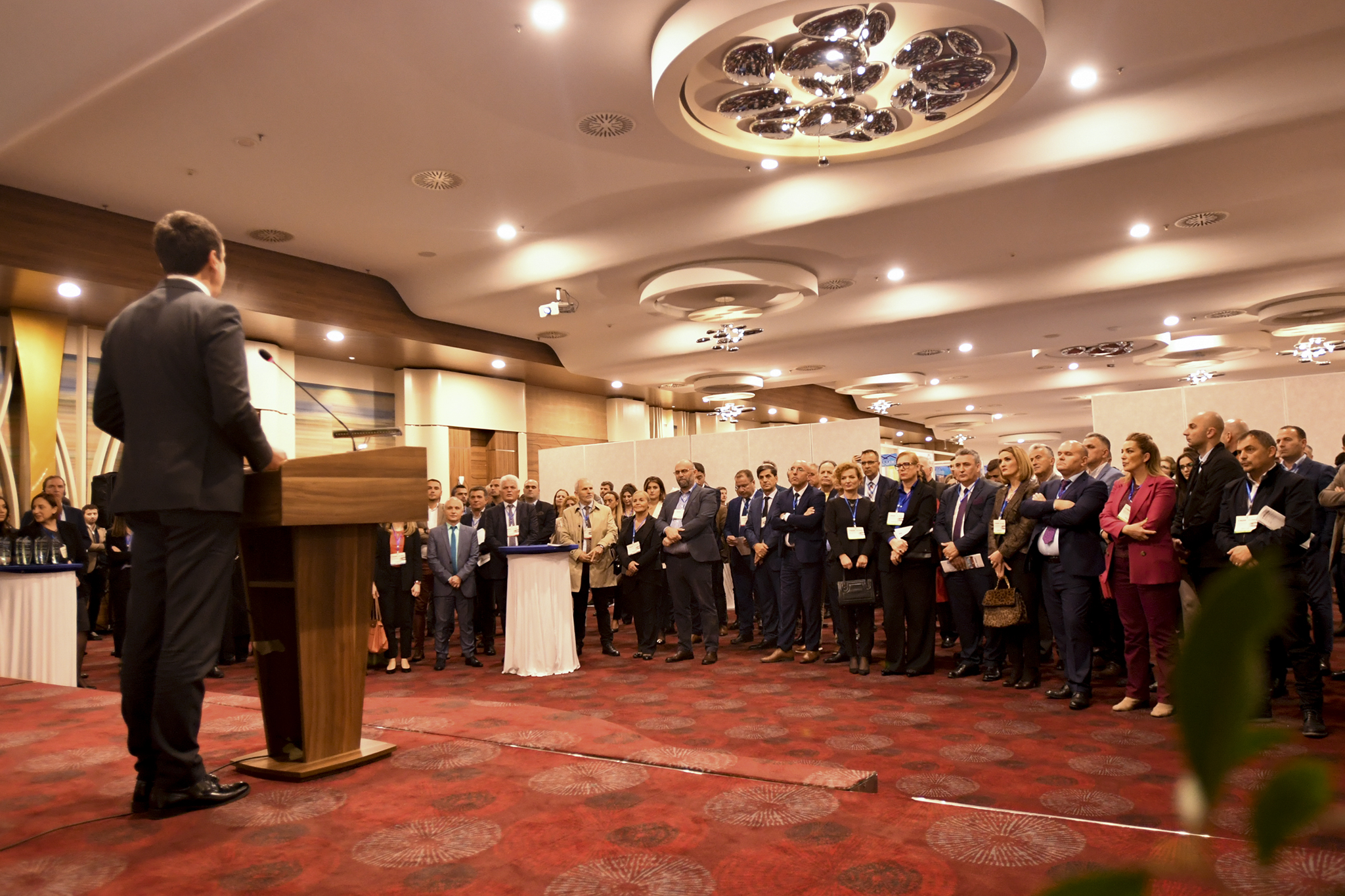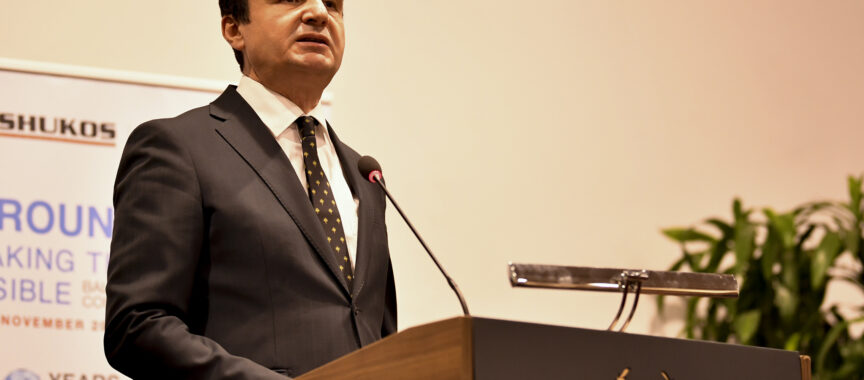Prishtina, 8 November 2022
The Balkan joint conference is the most important event for professionals in the water field of Albania, Kosovo, North Macedonia and Montenegro, said the Prime Minister of the Republic of Kosovo, Albin Kurti, at the opening of the 10th Conference and Exhibition of Common Balkan “Groundwater – Making the invisible visible”.
Prime Minister Kurti emphasized that, moreover, this annual conference takes into account the vital importance of water supply and sanitation services, as well as promotes the exchange of technological experiences and provides a perspective for young professionals in the sector.
Furthermore, Prime Minister Kurti emphasized that the two decades of ignoring the mismanagement, pollution and degradation of water resources, from the exploitation of sand and gravel, overexploitation, pollution and lack of planning, remains evident, while he emphasized that the Government under his leadership, has been mobilized on several fronts to address this challenge: starting from the strengthening of the legal framework and the return of legality to address water permits as well as concessions for commercial users; and continuing with concrete actions to address the need for the construction of new reservoirs, starting with those that are an indisputable priority, such as the Firaja dam that will provide water for the regions of Ferizaj, Gjilan and Pristina and the Kamenica barrier, to provide the necessary water for the driest area with water.
Likewise, the Prime Minister said that the drafting of feasibility studies for three new dams has already been initiated: Dragaqin in Therandë, Pollatë in Podujevë and Kučica in Skenderaj, as well as the drafting of a plan at the level of Kosovo for the construction of new dams, which it is an update of the water master plan of 1982, i.e. after a full 40 years. “The government is also seriously addressing the construction of water treatment plants – recently we inaugurated the plant in Pejë, and in the coming weeks we expect to inaugurate the plant in Gjakova. In order are the regional plants of Pristina together with Fushë Kosova, Obiliq and Graçanica, and of Mitrovica together with Vushtrri, and also the plant in Gjilan. We intend to complete the studies on the treatment of polluted water for the other 12 municipalities in order of size”, he said.
The complete speech of the Prime Minister of the Republic of Kosovo, Albin Kurti:
Dear hosts, leaders of SHUKALB and SHUKOS, Mr. Petrit Tare and Mr. Zenel Zenelaj,
Dear Deputy Ministers, Deputy Ministers of the Ministry of Environment, Spatial Planning and Infrastructure, Mrs. Linda Çavdërbasha and Deputy Minister of the Ministry of Economy, Mr. Getoar Mjeku,
The Honorable Ambassador of Switzerland, Thomas Kolly and Deputy German Ambassador, Matthias Conrad,
Dear shareholders of the water sector of Kosovo and Albania,
It is a pleasure to see how the tradition started by the water supply and sewerage associations of Albania and Kosovo is continuing. The Balkan joint conference is the most important event for professionals in the field of water in Albania, Kosovo, North Macedonia and Montenegro, in which topics and developments of interest to water supply and sewerage services are addressed. In addition, this annual conference recognizes the vital importance of water supply and sanitation services, promotes the exchange of technological experiences and provides a perspective for young professionals in the sector.
This is the second time that I am participating in this conference and one of the things that has impressed me the most is that the Conference is gaining a character beyond the Balkans with participation beyond the borders of our region and Europe. This is obviously a very positive development and the result of your dedicated work.
This year’s theme, in accordance with the theme of World Water Day, is “Groundwater – Making the Invisible Visible”, and in Kosovo the invisible will remain so for a few more days, until the inauguration that we will do in the next week of the underground water monitoring network, which has been missing and which we are making a reality with the support of the Swedish government. We intend to enrich this work with some research with international companies on the potential of underground water in order to supply drinking water and mineral water, agricultural use as well as thermal energy.
But what remains evident is two decades of ignoring the mismanagement, pollution and degradation of water resources, even if they are scarce, from sand and gravel exploitation, overexploitation, pollution and lack of planning. Kosovo is a state with water stress, with few renewable water resources of about 1600 cubic meters per year per inhabitant, which is about 20% of the average of the region. In addition, the amount of water accumulation in Kosovo of about 300 cubic meters per inhabitant is significantly smaller compared to the countries of the region or only 42% of the regional average.
If we add to this the predictions for the effects of climate change, the availability in the next 30 years is expected to drop by 20%. Despite all these factors, the degradation of this vital resource was tolerated over the years.
Therefore, my Government has mobilized on several fronts to address this challenge: starting from the strengthening of the legal framework and the return of legality to address water permits as well as concessions for commercial users; and continuing with concrete actions to address the need for the construction of new reservoirs, starting with those that are an indisputable priority, such as the Firaja dam that will provide water for the regions of Ferizaj, Gjilan and Pristina and the Kamenica barrier, to provide the necessary water for the driest area with water.
Also, we have already initiated the drafting of feasibility studies for three new dams: Dragaqin in Therandë, Pollatë in Podujevë and Kučica in Skenderaj, as well as the drafting of a plan at the level of Kosovo for the construction of new dams, which is an update of the water master plan of 1982, i.e. after 40 yeafrs. The government is also seriously addressing the construction of water treatment plants – recently we inaugurated the plant in Peja, and in the coming weeks we expect to inaugurate the plant in Gjakova. In order are the regional plants of Pristina together with Fushë Kosova, Obiliq and Graçanica, and of Mitrovica together with Vushtrri, and also the plant in Gjilan. We intend to complete the studies on the treatment of polluted water for the other 12 municipalities in order of size.
The success of governance with water services is also evident, because water is not only a resource, it is also a service and being a service it becomes usable as a resource, where we have an advance in reforms compared to the region and we are ready to share experiences our successful. The government has depoliticized the Boards of Directors, who now focus on improving the performance of the Regional Water Companies and not on staffing them. The main challenge here remains the loss of water which, although on average better than in many capitals in the region, does not allow us comfort, I take into account the lack of water in Kosovo. So, the loss of water in Kosovo hurts more than elsewhere. Not only because Kosovo is our country, but because we have much less water resources than other countries. I am happy that we have addressed this in the Inter ministerial Council for Water and the Boards are now mobilized to address this challenge seriously together with the management of the Regional Water Companies.
The last, an invisible one that we are trying to make visible, is the engagement and empowerment of young professionals in the water sector. For this purpose, we have set up a master’s program for the integrated management of water resources at the University of Pristina, with the support of the Swiss government, and we have opened the doors for their engagement in institutions as well as in project implementing units. All these successes highlight the support of the community of donors to whom we remain eternally grateful and grateful.
Thank you all and good luck in the future.
Last modified: November 9, 2022
